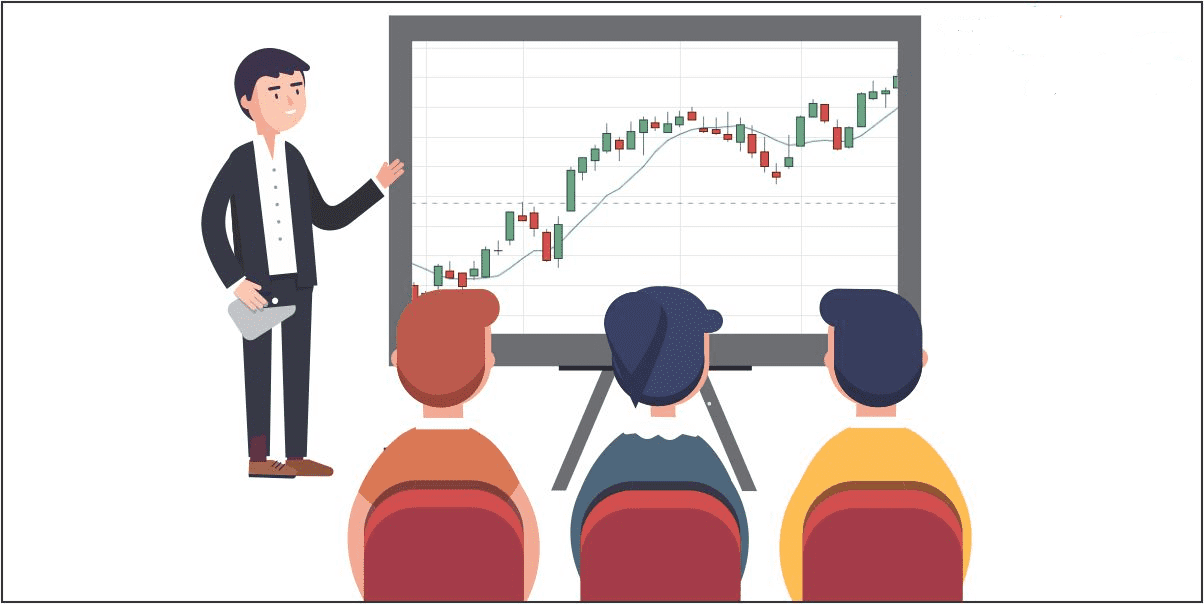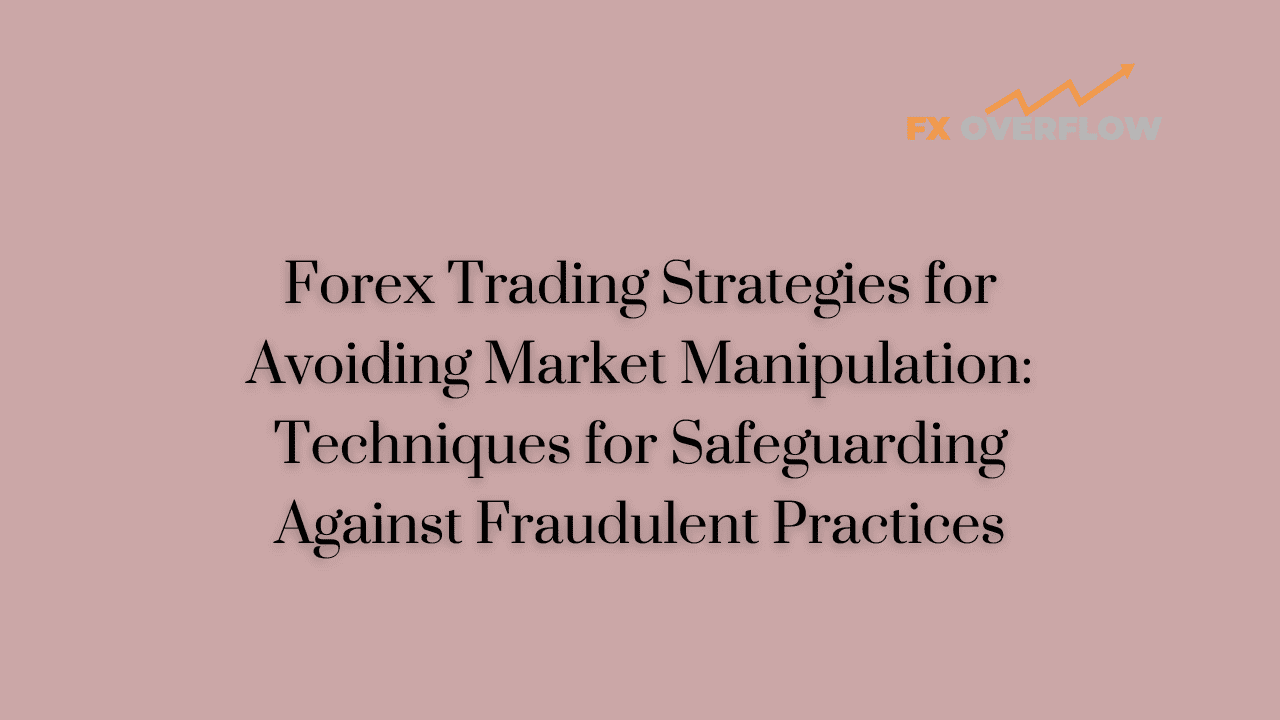Forex Trading Strategies for Avoiding Market Manipulation: Techniques for Safeguarding Against Fraudulent Practices
Forex trading, the global marketplace for trading currencies, presents lucrative opportunities for traders. However, it also carries the risk of market manipulation, where fraudulent practices can undermine fair trading conditions. This article explores effective strategies that traders can employ to safeguard themselves against market manipulation. From understanding the tactics used by manipulators to implementing protective measures, these techniques can help traders navigate the forex market with greater confidence and security.

Table content
1. Introduction
2. Effective Strategies for Safeguarding Against Market Manipulation:
3. Key Strategies for Avoiding Market Manipulation
4. Pros and Cons of the Strategies
5. FAQs
6. Footnote
Introduction:
The forex market, with its immense liquidity and accessibility, attracts traders from all walks of life. However, the decentralized and over-the-counter nature of the market can expose traders to potential risks, including market manipulation. Market manipulation involves intentional efforts to alter market conditions to benefit the manipulator, often at the expense of unsuspecting traders. These practices can range from spreading false information to creating artificial price movements. To mitigate such risks, traders need to be equipped with effective strategies for identifying and avoiding market manipulation.
Effective Strategies for Safeguarding Against Market Manipulation:
I) Educate Yourself: Knowledge is your best defense. Learn about the various types of market manipulation, such as spoofing, pump and dump, and wash trading. Understanding how these practices work will help you identify potential red flags.
II) Use Reputable Brokers: Choose well-regulated and reputable brokers. Regulated brokers adhere to strict industry standards and are less likely to engage in manipulative activities.
III) Analyze Volume and Price Movements: Pay attention to unusual spikes in trading volume and price movements. Sudden and abnormal price changes could indicate market manipulation.
IV) Diversify Your Portfolio: Spread your investments across different currency pairs to reduce the impact of potential manipulation on a single trade.
V) Technical Analysis and Indicators: Implement technical analysis tools and indicators to identify patterns and trends. These can help you distinguish between natural market movements and manipulation-driven fluctuations.

VI) Stay Informed About News and Events: Be aware of significant economic events, geopolitical developments, and market news. Manipulators often exploit such events to create false perceptions in the market.

Key Strategies for Avoiding Market Manipulation:
1. Education and Awareness:
- Educate yourself about the forex market, its participants, and common trading strategies.
- Stay updated with financial news and developments to identify potential manipulative activities.
2. Technical Analysis:
- Utilize technical analysis tools to identify abnormal price movements and patterns.
- Be cautious of sudden, unexplained spikes or drops in currency pairs' prices.
3. Fundamental Analysis:
- Conduct thorough research on economic indicators, geopolitical events, and central bank policies that can influence currency values.
- Avoid making trading decisions solely based on unverified rumors or news.
4. Diversification:
- Spread your investments across different currency pairs and assets to reduce the impact of market manipulation on a single position.
5. Risk Management:
- Set stop-loss and take-profit levels to limit potential losses and secure profits.
- Avoid overleveraging, which can make you more vulnerable to market manipulation.
6. Use Reputable Brokers:
- Choose regulated and reputable forex brokers that adhere to strict industry standards.
- Research broker reviews and verify their credibility before opening an account.
7. Avoid Pump and Dump Schemes:
- Beware of sudden, hyped-up trends that encourage you to buy into a currency pair, only to experience a sudden drop shortly after.
- Exercise caution when joining online trading communities that promote such schemes.
8. Trust Your Analysis:
- Stick to your trading strategy and analysis rather than succumbing to emotional impulses caused by market manipulation.
9. Report Suspicious Activities:
- If you suspect market manipulation, report it to relevant authorities or regulatory bodies.
- Help maintain a fair trading environment by contributing to the prevention of fraudulent activities.
10. Continuous Learning:
- Stay updated with market trends and manipulative tactics by engaging in ongoing learning and self-improvement.
Pros and Cons of the Strategies:
Pros:
- Increased Awareness: These strategies enhance your ability to spot manipulative activities.
- Risk Mitigation: By avoiding manipulated trades, you reduce the risk of substantial financial losses.
- Confidence: Armed with knowledge, you can trade with greater confidence and composure.
Cons:
- Complexity: Some strategies may require a deep understanding of market dynamics and analysis techniques.
- No Absolute Guarantee: While these strategies reduce the risk, they cannot entirely eliminate the possibility of encountering market manipulation.
FAQs:
Q1: What is market manipulation in forex trading?
A: Market manipulation refers to intentional actions taken by individuals or groups to create artificial market conditions that benefit them, often at the expense of other traders. This can involve spreading false information, creating artificial price movements, or engaging in pump and dump schemes.
Q2: How can I identify market manipulation?
A: Market manipulation can be identified through abnormal price movements, sudden spikes or drops without clear reasons, and rumors that lack credible sources. Utilizing technical and fundamental analysis tools can help you detect such activities.
Q3: Why is choosing the right broker important to avoid manipulation?
A: Reputable brokers adhere to regulatory standards and offer transparent trading conditions. Choosing a regulated broker reduces the risk of falling victim to unscrupulous practices.
Q4: How can I protect my investments from market manipulation?
A: Diversification, risk management, and a well-defined trading strategy are key. By spreading your investments, setting stop-loss and take-profit levels, and avoiding overleveraging, you can minimize the impact of market manipulation.
Q5: Is technical analysis more effective than fundamental analysis for detecting manipulation?
A: Both approaches have their merits. Technical analysis helps identify abnormal price movements, while fundamental analysis helps you understand the broader economic context. A combination of both can provide a more comprehensive view.
Q6: What steps should I take if I suspect market manipulation?
A: Report any suspicious activities to relevant authorities or regulatory bodies. Your contribution can help maintain a fair and transparent trading environment.
Q7: Can I completely eliminate the risk of market manipulation? While it's challenging to eliminate all risks, staying educated, practicing due diligence, and employing the strategies mentioned in this article can significantly reduce your vulnerability to market manipulation.
Q8: How can I stay updated about manipulative tactics? Engage in continuous learning through reputable educational resources, financial news, and online communities. This will help you stay informed about evolving manipulative tactics.
Footnote:
Forex trading offers vast opportunities, but it's crucial for traders to be aware of the potential risks, particularly market manipulation. By understanding the tactics used by manipulators and employing protective strategies, traders can navigate the forex market with greater confidence, safeguarding their investments and fostering a fair and transparent trading environment. Continuous education, due diligence, and a commitment to responsible trading are essential in the fight against fraudulent practices in the forex market.











Discussion